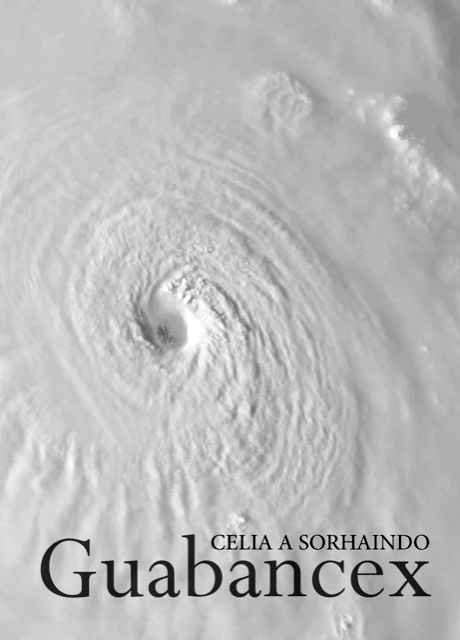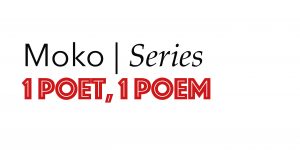I‘ve chosen to write about the poem “What Do I Know” by Dominican poet Celia Sorhaindo, which appears in her book Guabancex (which was recently shortlisted for the 2021 OCM Bocas Poetry Prize).
Guabancex is a collection of 16 poems and is “named in recognition of the ancient indigenous peoples of the Caribbean”. The collection begins with “a poem filled with words not metaphors” that explains the poet’s resistance to the use of artificial literary devices in rendering the personal experience of Hurricane Maria’s impact on Dominica. Maria was a category 5 hurricane that hit Dominica in September 2017 resulting in numerous fatalities and catastrophic destruction. The hurricane was the country’s worst-ever natural disaster and is the tenth-most intense Atlantic hurricane on record, which hit not only Dominica, but also Saint Croix, and Puerto Rico.
Sorhaindo recreates the distress associated with uncertainty in the aftermath of the hurricane and patterns of survival. Guabancex therefore functions as a treatise on post natural disaster logistics in the Caribbean where infrastructural planning remains precarious because of threatening weather systems. This overarching concern of the collection is not unfamiliar in Caribbean literature.
However, the poet’s approach does not sanitize the experience but instead documents and comments on what happened from the perspectives of those directly affected. It is thus largely an artfully rendered work in reportage. Poeticization is employed mainly in structure, syntax, punctuation and capitalization to add form and meaning to the work. The peculiar structures of “Invoked” and “Hurricane Praxis (Xorcising Maria Xperience),” for instance, reflect the uncertainty of the hurricane. The collection suggests that social, political and infrastructural systems failed the people of Dominica, and it refuses to rely even on literary systems, choosing not to embellish the experience with overtly rhetorical language.
the poet’s approach does not sanitize the experience but instead documents and comments on what happened.
In this collection of intensely raw restimulated trauma that compels the reader as a cautionary work in literature, the poem I was most moved by came at the very end, “What Do I Know”.
This poem continues the religious imagery found throughout the collection giving us Mr Elias John-Baptist’s third person account of the hurricane including his conversation with God whose eye stayed above his house for eight hours. The poem posits that there are lessons in the hurricane and, possibly, the knowledge of God. This poem poses the question, to what extent can the divine be identified as complicit in the operation of natural forces? During the hurricane Mr Elias John-Baptiste is lifted up in a whirlwind and God speaks to him; “I know that you have wrought well, wrought well; you are well-wrought and/ ready to redeem…”.
Yet, according to his family, the experience left him disconnected from reality. Subsequently, he has a drastic diet of popcorn and allows his hair to grow. In this way, the poem raises the highly important issue of mental health and how it is affected by natural disasters. The lyrical persona has hallucinations and is treated with medication for his psychological struggles. Though the religious references in this poem are mainly Christian ones, beginning with the John the Baptist reference in the name of the protagonist, this poem links strongly to the title of the collection Guabancex which, according to the author’s note, is a Taino word for the supreme feminine energy that is related to destructive natural forces.
The direct connection between God and the hurricane that comes at the end of the collection therefore neatly resolves the thesis established from the start in the title of the work and continues throughout the collection until the hurricane finally becomes a persona in the final poem. This collection reminds us critically of Kamau Brathwiate’s seminal text History of the Voice, in which the image of the hurricane is used to comment on the ways in which Caribbean writers utilize the English language in their work without committing to traditional poetic scansion, choosing instead to remain faithful to the landscape and weather systems from which the work emerges.
∞
Amanda T. McIntyre is a Trinidadian poet, writer, artist and advocate focusing on cultural studies and literary scholarship. Her work examines Caribbean socio-politics through recollecting and reconceiving mythologies and oral histories.


A fair, if not a little generous, critique, well articulated. Thanks
Thank you for sharing Amanda. I don’t usually like poetry but after reading this review I will definitely check out this collection as the themes mentioned here about mental health, raw language, religious imagery, and the questioning of God in the face of natural catastrophes appeal to me.
This was well said, Amanda. I am very interested in reading more from this poet.